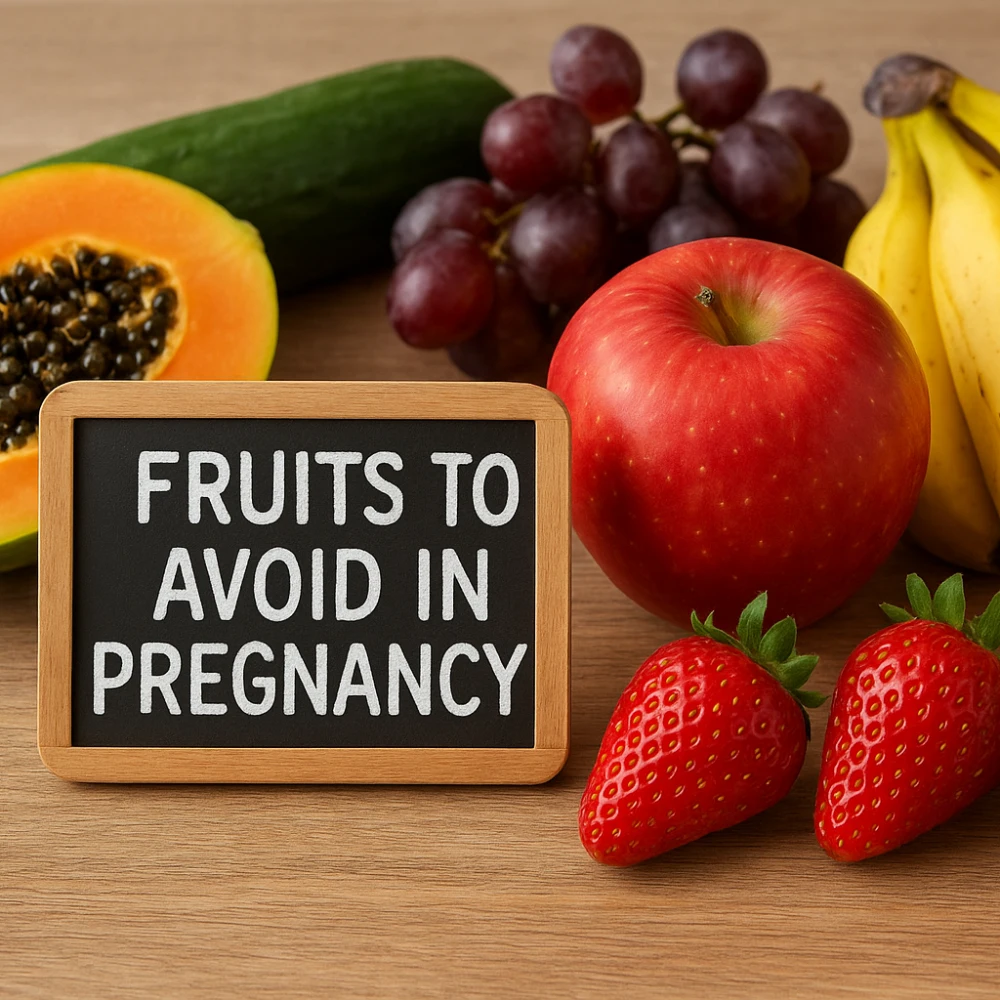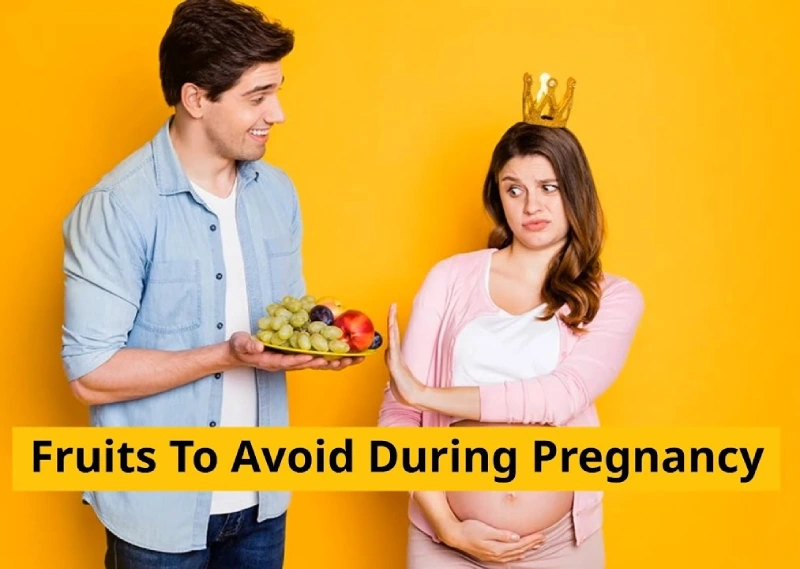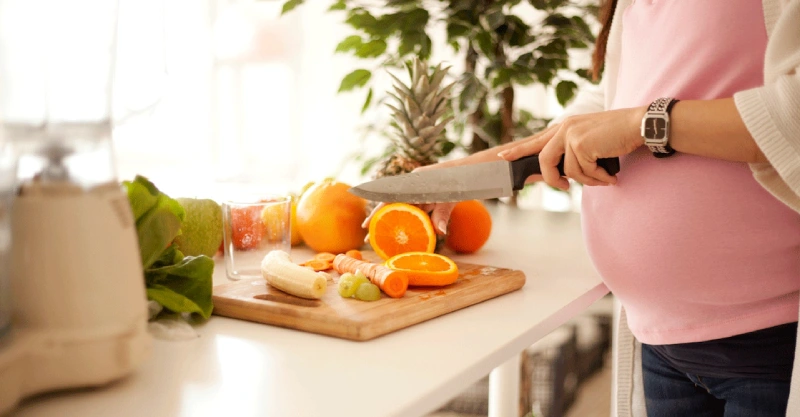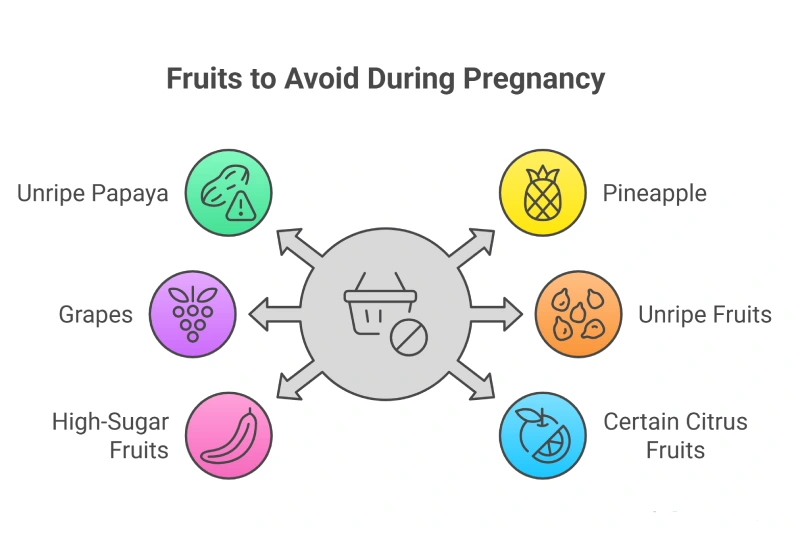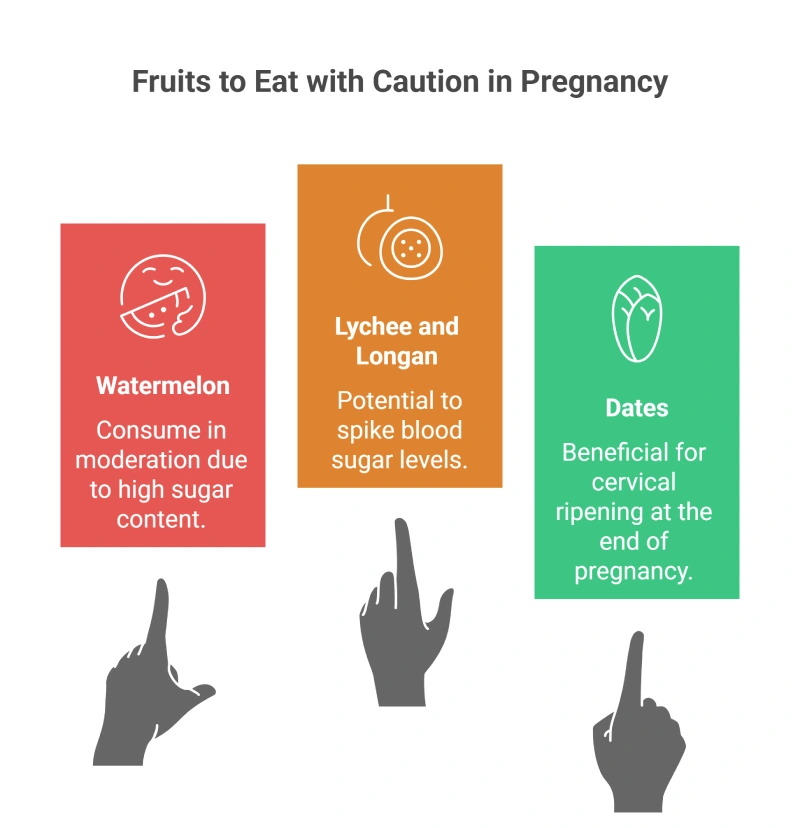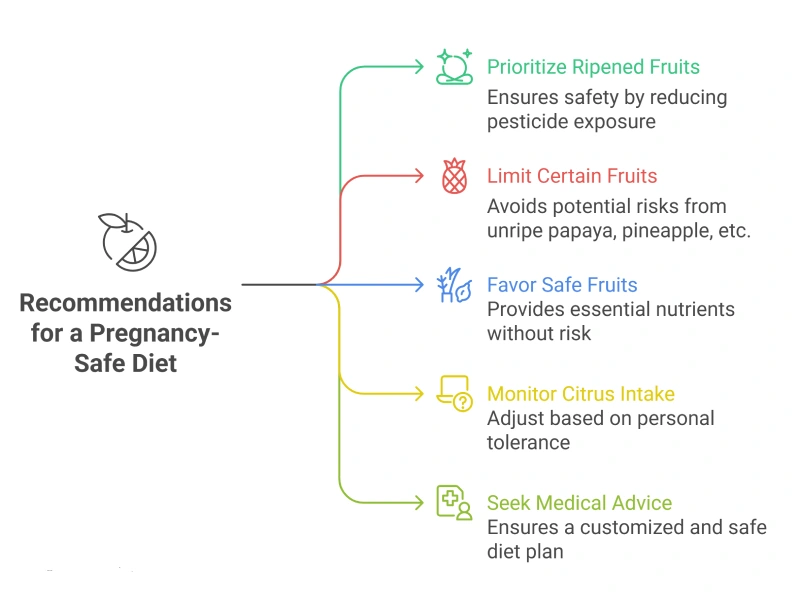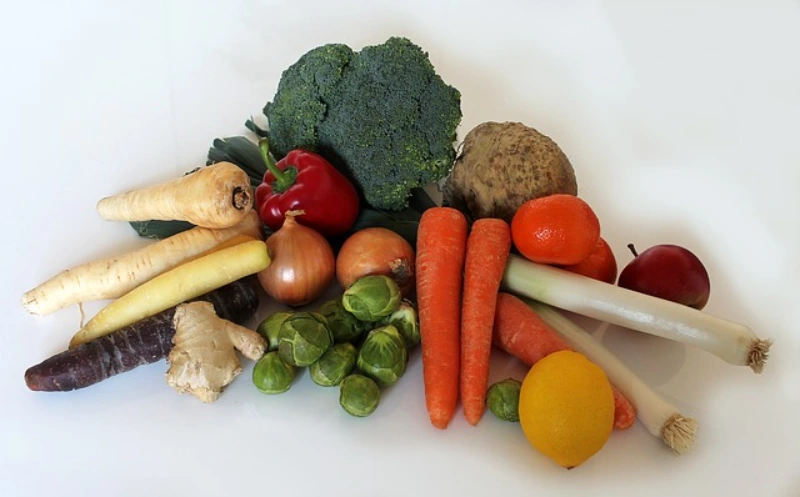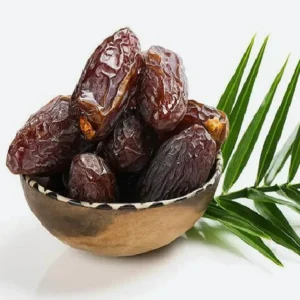Pregnancy is a very crucial period, and proper attention should be paid to what mothers eat. Although fruits are good sources of essential nutrients, they sometimes subject expectant mothers to toxins, risk factors, or undesirable side effects. In this article, we will provide all the details about fruits to avoid in pregnancy for pregnancy health.
The Importance of Diet During Pregnancy
Pregnancy is a time when nutrition is especially critical, as both the expecting mother and the developing fetus need plenty of vitamins, minerals, and nutrients. Fruits are generally encouraged as part of a pregnancy diet because they contain vital nutrients, fiber, and antioxidants. However, certain fruits contain compounds or toxins that may increase the risk of miscarriage, preterm labor, or fetal harm if not consumed cautiously. It is essential to understand which fruits to avoid during pregnancy and why.
Fruit Safety Evaluation Standard
Nutritionists suggest that pregnant ladies should consider evaluating fruits in the following regard:
- Possible poisons or enzymes (e.g., latex, papain, bromelain)
- Sugar content and Glycemic index.
- Pesticide residuals
- preparation and digestibility.
Clinical evidence and safety reviews suggest guidelines on the use of these medications, which are provided by the authorities in health care, such as the Mayo Clinic and the American Pregnancy Association.
Which Fruits to Avoid During Pregnancy
Here are some of the fruits not to eat during pregnancy:
· Papaya (Unripe or semi-ripe)
Unripe or semi-ripe papaya is the one that has the latex, which may cause uterine contractions and preterm birth or miscarriage. Ripe papaya is usually safe when consumed in moderation.
· Pineapple
It contains bromelain, an enzyme that may theoretically induce miscarriage in large quantities because it can soften the cervix, particularly during the first trimester. Fresh pineapple can be taken occasionally, but not in large amounts.
· Grapes
Some specialists recommend the restriction or even avoidance of grapes, particularly in the third trimester, because substantial amounts of resveratrol may interfere with the hormone balance. The skin of grapes can be a source of pesticides, and overconsumption of grapes can lead to stomachache or diarrhea. But instead of grapes, pregnant ladies can eat Iranian raisins, which are safe and nutritious during pregnancy when consumed in moderation
· Unripe Fruits
Fruits that are not yet mature e.g. papaya and bananas, are difficult to digest and may have more compounds, which induce uterine activity.
· High-Sugar Fruits
Fruits such as mangoes, ripe bananas and high amounts of dried fruits are among the fruits to avoid while pregnant. Because they contain natural sugars, which may increase the level of glucose in the blood, which is dangerous to women with gestational diabetes.
· Certain Citrus Fruits
Oranges, lemons, and grapefruits are good sources of vitamin C and taste good but they may give some pregnant people gastric discomfort or worsen heartburn. Individuals whose digestive systems are sensitive should eat in moderation.
What Dry Fruits not to Eat in Pregnancy
The dried fruits (dried apricots, prunes, raisins, etc.) may be helpful due to the presence of fibers and minerals, but they contain many calories and are rich in natural sugars. To understand which dry fruits to avoid during pregnancy, remember that commercially dried fruits can also be sprayed with sulfites or preservatives, which can cause allergic reactions or stomach sickness in sensitive people. Eating dry fruits in moderation is advisable, with preference to organic, unsulphured ones.
Read More: sunflower seeds during pregnancy second trimester
Fruits to Eat with Caution in Pregnancy
Here is the list of fruits that pregnant women should eat with caution:
- Watermelon: It is rich in water, high sugar, consume in moderation.
- Lychee and Longan: Have the potential to spike blood sugar.
- Dates: Healthy yet rich in calories and sugars; these should be eaten only in the end of pregnancy because they might be helpful in cervical ripening.
Read More: raisins during pregnancy first trimester
Pregnancy-Safe Fruit Choices
Most of the fruits are safe and good during pregnancy when consumed as a balanced diet. These include apples, pears, peaches, plums, melons, berries (washed thoroughly), avocados and fully ripened papaya. Also eating dried fruits such as dried apple or dried apricot is good.
Citrus fruits, such as oranges, lemons, and grapefruits, are a good source of vitamin C and can be used as a healthy part of safety during pregnancy. But they can worsen the acid reflux or stomach ache in vulnerable women, so it is recommended to take moderate and personal doses.
Table: Fruit Safety for Pregnant Women
| Fruit | Risk Factor | Safe in Moderation? | Key Nutrients | Note |
| Papaya (unripe) | Uterine stimulant | No | Vitamin C, A | Avoid unripe/semi-ripe completely |
| Pineapple | Cervical ripening | Yes (limited) | Vitamin C, Manganese | Limit in first trimester |
| Grapes | Hormonal effects | Yes (moderate) | Vitamin K, Resveratrol | Avoid excess, especially late pregnancy |
| Dry fruits (sulfited) | Allergens, sugar | Yes (moderate) | Fiber, Minerals | Choose organic, unsulphured |
| Citrus fruits | Acid reflux | Yes | Vitamin C | Limit if gastric upset occurs |
| High-sugar fruits | Gestational diabetes | Yes (small amounts) | Vitamins, Sugars | Monitor intake with GD |
Nutrient Considerations and Risk Factors
By paying attention to fruits to avoid in pregnancy, remember that it is most likely to have a healthy pregnancy when a variety of fruits are eaten, so as to maximize the nutrients and reduce the exposure to toxins. Many of the safe fruits contain nutrients such as vitamin C, potassium, and fiber, yet those also may react variously with the risk factors of an individual, including either a predisposition to gestational diabetes or food allergies.
Recommendations for a Pregnancy-Safe Diet
Here are some tips for pregnant women about fruits to avoid in pregnancy:
- Prioritize fully ripened fruits and ensure proper washing to reduce pesticide toxins.
- Limit or avoid unripe papaya, large amounts of pineapple, high-sugar fruits, and excessive grapes.
- Favor fruits like apples, pears, berries, melons, and avocados, which are safe and nutrient-dense.
- Monitor for personal tolerance to citrus fruits, adjust intake.
- Seek medical advice if you are not sure, or for customized diet plans.
Expert Perspective and Conclusion
Medical experts such as obstetricians, gynecologists, and pregnancy nutrition specialists, stress the fruits to avoid while pregnant and the importance of making informed dietary choices according to scientific evidence and professional guidelines. Reliable sources such as the NHS, Mayo Clinic, and accredited hospital nutrition departments reaffirm the dangers of certain fruits and advocate moderation and hygiene as core principles of pregnancy safety.
Kourosh Foods: Quality and Innovation in Every Bite
Kourosh Foods is a well-known Iranian firm that deals with sourcing, production, and exportation of high-quality dried fruits such as dates, raisins, apricots and figs, among other dried fruits. The company focuses on the use of high standards through production to delivery in order to preserve the original flavor and the nutritional content of the products. Contact us to place your order.
FAQs
- Which fruits should be avoided during pregnancy?
Unripe papaya, a lot of pineapple, grapes, and certain dried fruits of high sugar content or processed fruits are to be avoided during pregnancy.
- Why should papaya be avoided during pregnancy?
The latex of unripe papaya may cause uterine contractions and may expose the fetus to high probability of miscarriage or preterm delivery.
- Are citrus fruits safe to eat during pregnancy?
Yes, citrus fruits are generally safe but should be eaten in moderation if they cause gastric discomfort or acid reflux.
- Can pineapple cause miscarriage during pregnancy?
Consuming large amounts of pineapple, especially in the first trimester, may increase miscarriage risk due to the enzyme bromelain.
- Are grapes safe to eat in pregnancy?
Grapes are ok to consume moderately, however, when consumed in large amounts, they can influence hormone balance or lead to good digestion.
- Why should unripe fruits be avoided during pregnancy?
Unripe fruits may contain compounds that trigger uterine activity and are harder to digest.
- What are the risks of eating high-sugar fruits during pregnancy?
High-sugar fruits can raise blood glucose levels, posing risks for gestational diabetes and excessive weight gain.
- How can I ensure I’m getting enough nutrients during pregnancy without harmful fruits?
Pay attention to a healthy diet based on the variety of whole grains, vegetables, fully ripe fruits and consult medical experts to get personal recommendations.

